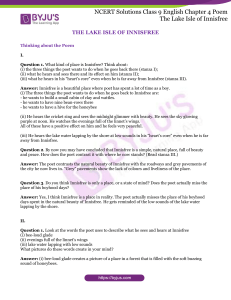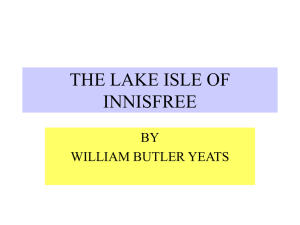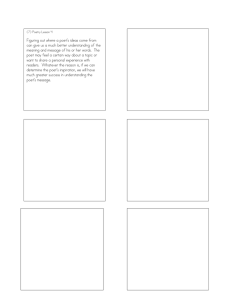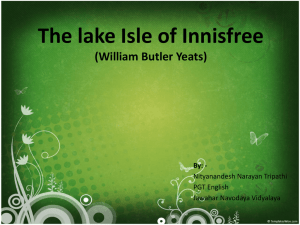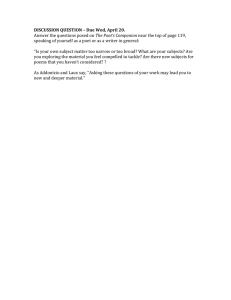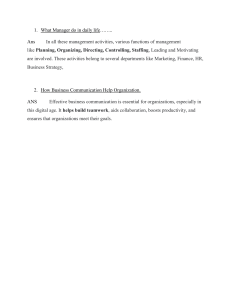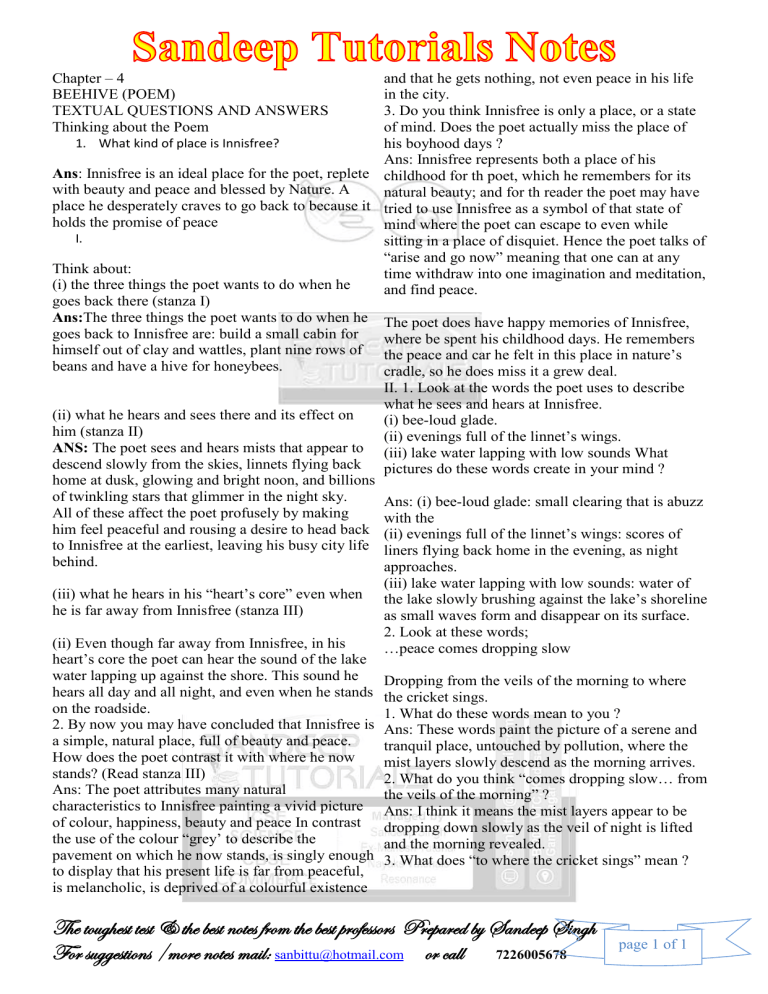
Chapter – 4 BEEHIVE (POEM) TEXTUAL QUESTIONS AND ANSWERS Thinking about the Poem and that he gets nothing, not even peace in his life in the city. 3. Do you think Innisfree is only a place, or a state of mind. Does the poet actually miss the place of 1. What kind of place is Innisfree? his boyhood days ? Ans: Innisfree represents both a place of his Ans: Innisfree is an ideal place for the poet, replete childhood for th poet, which he remembers for its with beauty and peace and blessed by Nature. A natural beauty; and for th reader the poet may have place he desperately craves to go back to because it tried to use Innisfree as a symbol of that state of holds the promise of peace mind where the poet can escape to even while I. sitting in a place of disquiet. Hence the poet talks of “arise and go now” meaning that one can at any Think about: time withdraw into one imagination and meditation, (i) the three things the poet wants to do when he and find peace. goes back there (stanza I) Ans:The three things the poet wants to do when he The poet does have happy memories of Innisfree, goes back to Innisfree are: build a small cabin for where be spent his childhood days. He remembers himself out of clay and wattles, plant nine rows of the peace and car he felt in this place in nature’s beans and have a hive for honeybees. cradle, so he does miss it a grew deal. (ii) what he hears and sees there and its effect on him (stanza II) ANS: The poet sees and hears mists that appear to descend slowly from the skies, linnets flying back home at dusk, glowing and bright noon, and billions of twinkling stars that glimmer in the night sky. All of these affect the poet profusely by making him feel peaceful and rousing a desire to head back to Innisfree at the earliest, leaving his busy city life behind. (iii) what he hears in his “heart’s core” even when he is far away from Innisfree (stanza III) (ii) Even though far away from Innisfree, in his heart’s core the poet can hear the sound of the lake water lapping up against the shore. This sound he hears all day and all night, and even when he stands on the roadside. 2. By now you may have concluded that Innisfree is a simple, natural place, full of beauty and peace. How does the poet contrast it with where he now stands? (Read stanza III) Ans: The poet attributes many natural characteristics to Innisfree painting a vivid picture of colour, happiness, beauty and peace In contrast the use of the colour “grey’ to describe the pavement on which he now stands, is singly enough to display that his present life is far from peaceful, is melancholic, is deprived of a colourful existence II. 1. Look at the words the poet uses to describe what he sees and hears at Innisfree. (i) bee-loud glade. (ii) evenings full of the linnet’s wings. (iii) lake water lapping with low sounds What pictures do these words create in your mind ? Ans: (i) bee-loud glade: small clearing that is abuzz with the (ii) evenings full of the linnet’s wings: scores of liners flying back home in the evening, as night approaches. (iii) lake water lapping with low sounds: water of the lake slowly brushing against the lake’s shoreline as small waves form and disappear on its surface. 2. Look at these words; …peace comes dropping slow Dropping from the veils of the morning to where the cricket sings. 1. What do these words mean to you ? Ans: These words paint the picture of a serene and tranquil place, untouched by pollution, where the mist layers slowly descend as the morning arrives. 2. What do you think “comes dropping slow… from the veils of the morning” ? Ans: I think it means the mist layers appear to be dropping down slowly as the veil of night is lifted and the morning revealed. 3. What does “to where the cricket sings” mean ? The toughest test & the best notes from the best professors Prepared by Sandeep Singh For suggestions /more notes mail: sanbittu@hotmail.com or call 7226005678 page 1 of 1 Ans: I think it means the low levels of the ground, specifically the grass, where the crickets are usually found. ADDITIONAL QUESTIONS WITH ANSWERS Answer the following questions : 1. Where does the poet want to go ? Why ? Ans: The speaker of the above quoted lines is the poet, William Butler Yeats. (b) Where does the speaker want to go? Why? ad Ans: The speaker wants to go to Innisfree, a place he had spent his childhood in. The poet wants to get away from the humdrum of Ans: The poet wants to go to Innisfree, a serene and city life and Innisfree seems to be the idyllic place peaceful place surrounded by Nature. offering him refuge from the ravages of city life. So 2. What does the poet plan to do in Innisfree ? the poet wants to leave all behind and go to Ans: Once in Innisfree the poet plans on building a Innisfree, to spend his days in peace in the lap of small cabin out of clay and wattles, plant a small nature. bean garden, have a hive for bees and then live (c) What does the speaker hear in his heart’s core ? alone in his glade where only bees can be heard Ans: The speaker hears the water of the lake in buzzing. Innisfree as it splashes along the sides of the coast, 3. Where does the poet want to go ? What does he in his heart’s core. plan on doing there ? (d) ‘Pavements grey’ is a reference to the Ans: [See Additional Questions with Answers (Q. (i) cobbled pavements of the city. No. 1 and 2)] (ii) grey coloured roads of the poet’s city. 4. “I hear it in my deep heart’s core.” (iii) old roads. (i) Who is the speaker ? (iv) pavement near the lake. ad Ans: The speaker of the above quoted line is the Ans: (i) cobbled pavements of the city. poet William Butler Yeats himself. (ii) What does he hear in his ‘deep heart’s core” ? When ? Ans: The speaker can hear the sound of water lapping with low sounds along the lake’s shore located in Innisfree. OR What does the speaker hear ? Why ? Ans: (First part same as in the previous question) The speaker hears the sounds of Innisfree in his heart’s core because he is drawn to the place and wants to go there to escape the humdrums of city life. And so hen he is in the midst of all city life, he cannot help but wish he was in Innisfree instead. (iii) What does he plan to do about it ? Ans: The speaker decides to move to Innisfree so that he can be near the natural sounds and sights he so dearly loves and which call out to him even in the midst of buzzing city life. Reference to the context 1. “I will arise and go now, for always night and day I hear the lake water lapping with low sounds by the shore; While I stand on the roadway, or on the pavements grey, I hear it in the deep heart’s core.” (a) Who is the speaker? The toughest test & the best notes from the best professors Prepared by Sandeep Singh For suggestions /more notes mail: sanbittu@hotmail.com or call 7226005678 page 1 of 1
